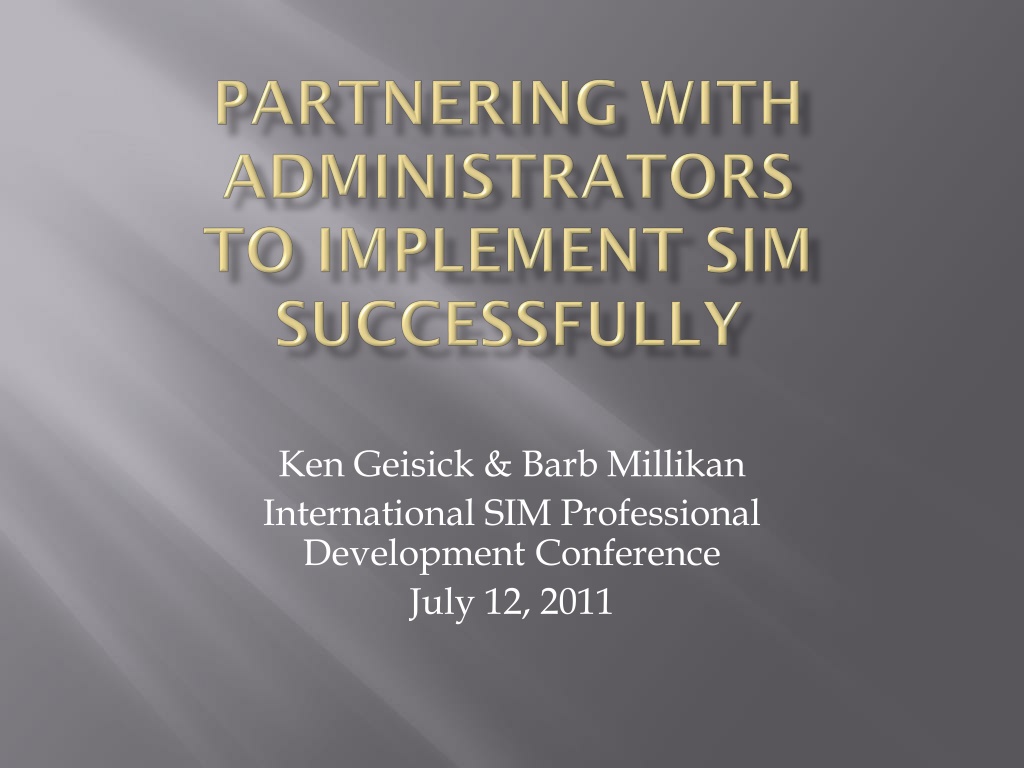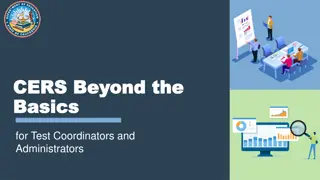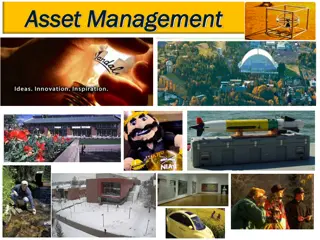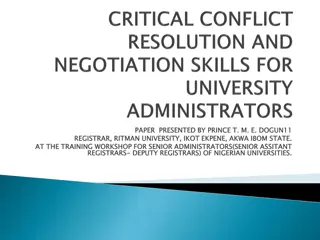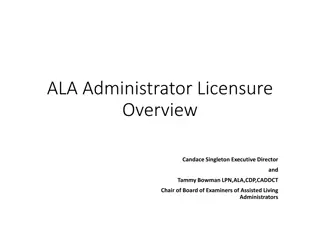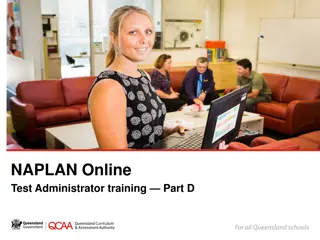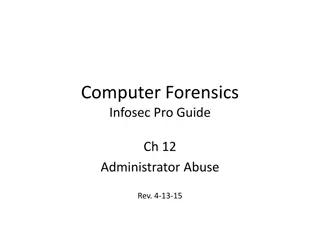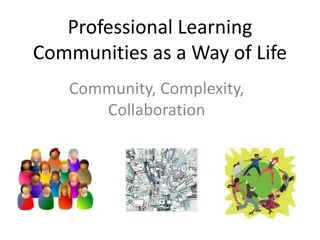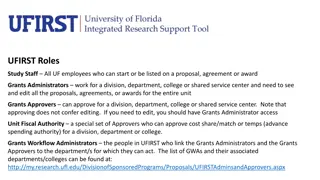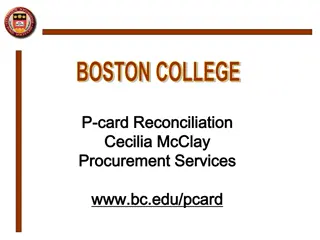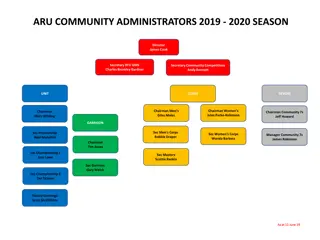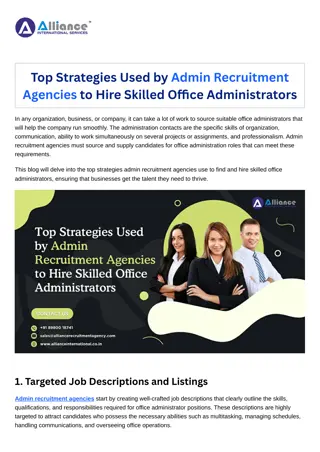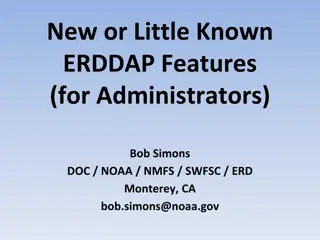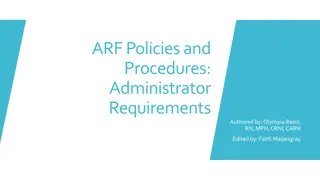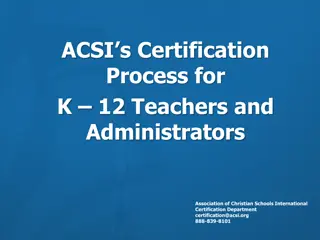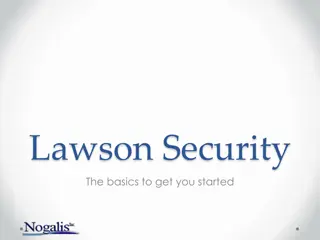Professional Development Strategies for Effective Collaboration with Administrators
Explore key strategies and tools for successful collaboration with administrators in professional development settings. The content emphasizes building trust, understanding roles, and promoting partnership through equality, choice, and dialogue. Learn how to value diverse perspectives and empower teachers by offering meaningful choices in their development.
Download Presentation

Please find below an Image/Link to download the presentation.
The content on the website is provided AS IS for your information and personal use only. It may not be sold, licensed, or shared on other websites without obtaining consent from the author. Download presentation by click this link. If you encounter any issues during the download, it is possible that the publisher has removed the file from their server.
E N D
Presentation Transcript
Ken Geisick & Barb Millikan International SIM Professional Development Conference July 12, 2011
A template agenda for a 2 hour meeting Strategies to identify and work with different kinds of administrators Tools to effectively partner and collaborate long term with administrators 7/12/11
YOU DONT KNOW THEM THEY DON T KNOW YOU What will the administrator want from me? What does this person want from me? Why should I trust them with my staff? What is their role? 7/12/11
Equality Choice Voice Reflection Dialogue Praxis 7/12/11 Partnership Fieldbook, J. Knight
Partnership carries the intention to balance power between ourselves and those around us. Peter Block, Stewardship 7/12/11 Partnership Fieldbook, J. Knight
Do I truly acknowledge teachers whose opinions are different from mine? Do teachers feel that their knowledge and experience count in our work? Do I believe that teachers bring important knowledge to our work that I don t have? 7/12/11 Partnership Fieldbook, J. Knight
Without choice there is no partnership Peter Senge 7/12/11 Partnership Fieldbook, J. Knight
The defining attribute of partnership: Partners choose to work together. Both have a say. Both guide decisions. Both have a right to say yes or no. Offering choices doesn t mean everything is up for grabs. Jim Knight 7/12/11 Partnership Fieldbook, J. Knight
Does the professional development offer true choices? Do I allow teachers to make their own decisions about the materials presented during workshops? Do I respect teachers decisions if they differ from mine? Are teachers forced to listen to/attend the professional development? Do I recognize that teachers are going to need to adapt materials for their individual classrooms? 7/12/11 Partnership Fieldbook, J. Knight
Everyones opinions matter Listen to understand Greater learning can occur when people genuinely listen to a variety of opinions and ideas 7/12/11 Partnership Fieldbook, J. Knight
Do I really listen with the intent to understand? Do I fully understand what a colleague has to say before I share my point of view? Do I provide a variety of ways for people to talk with each other during meetings? Do I ask questions that encourage people to say what they really think? 7/12/11 Partnership Fieldbook, J. Knight
How to make sense of whatever we are learning Freedom to consider ideas before adopting them Freedom to accept or reject an idea Teachers are thinkers and decision makers. Without reflection, they could be neither. 7/12/11 Partnership Fieldbook, J. Knight
Am I really able to accept teachers rejecting the views I offer? Do I encourage a variety of views about the content I share with teachers? Do I provide enough information to allow participants to make good decisions about the content I share? 7/12/11 Partnership Fieldbook, J. Knight
In a dialogue, there is no attempt to gain points, or to make your particular view prevail. Do what you can to make dialogue occur. Avoid manipulation. Engage participants in conversation about content, and think and learn with participants as everyone moves through the content being discussed. By seeing others as equals, by listening empathetically and encouraging everyone to speak their minds, you can encourage dialogue. 7/12/11 Partnership Fieldbook, J. Knight
Do I speak less than 60 percent of the time during meetings? Are my staff able to create new ideas during meetings? Are the conversations during meetings as lively as the ones during the breaks? 7/12/11 Partnership Fieldbook, J. Knight
The act of applying new ideas to our own ideas. When we learn, reflect and act. Praxis is enabled when teachers have a real chance to explore, prod, stretch, and recreate whatever they are studying to roll up their sleeves, consider how they teach, learn a new approach, and then reconsider their teaching practices and reshape the new approach, if necessary, until it can work in their classroom. 7/12/11 Partnership Fieldbook, J. Knight
Are teachers able to truly explore how they might use SIM? Do teachers really consider the practical implications of what I am talking about? Do teachers in my meetings use most of their time meaningfully? Are my meetings really useful? 7/12/11 Partnership Fieldbook, J. Knight
Expected Meeting Outcomes: Establish a relationship based on the partnership principles Discuss importance of principal s role in closing the achievement gap Discuss importance of your role in supporting administrators and staff Assess principal profile Jointly create a Professional Development Plan 7/12/11
8:30-8:40 8:40-9:00 9:00-9:30 9:30-10:10 10:10-10:20 10:20-10:30 Get to know your administrator Leading the Way(Closing the Gap) Assess Principal Readiness Begin developing administrator action plan Administrator pulse check Identify next meeting, next steps and essential supports 7/12/11
8:30-8:40 8:40-9:00 9:00-9:30 9:30-10:10 10:10-10:20 10:20-10:30 Get to know your administrator Leading the Way (Close the Gap) Assess Principal Readiness Begin developing administrator action plan Administrator pulse check Identify next meeting, next steps and essential supports 7/12/11
12 12 Grade Level Expectations 11 10 Demands Skills 9 8 7 6 5 4 Years in School 7/12/11
12 12 Grade Level Expectations 11 10 Demands Skills 9 8 7 Existing support 6 5 4 Years in School 7/12/11
Infrastructure Supports Flexible Scheduling Planning Time Grade Level Expectations Demands Skills Professional Development Time Infrastructure Supports Extended Learning Time Smaller Learning Communities Existing Support Years in School 7/12/11
System Learning Supports Progress Monitoring / Data-Based Decision Making Collaborative Problem- Solving Grade Level Expectations Demands Skills System Learning Supports Instructional Coaching Professional Learning Infrastructure Supports Current Supports Years in School 7/12/11
Instructional Core Motivation/Behavior Supports / Smarter Standards- Informed Curriculum Planning Instructional Core Grade Level Expectations Demands Skills Engaging Instructional Materials& Activities System Learning Supports Student-Informed Teaching Infrastructure Supports Connected Courses & Coherent Learning Current Supports Continuum of Literacy Instruction Years in School 7/12/11
Administrative Leadership Administrative Leadership Holds vision while telling current reality. / Differentiates between technical & adaptive problems Instructional Core Grade Level Expectations Demands Skills System Learning Supports Designs adult learning processes: builds a learning organization. Infrastructure Supports Uses data to leverage forward progress. Current Supports Focuses on research validated vital behaviors. Years in School 7/12/11
8:30-8:40 8:40-9:00 9:00-9:30 9:30-10:10 10:10-10:20 10:20-10:30 Get to know your administrator Leading the Way (Close the Gap) Assess Principal Readiness Begin developing administrator Action Plan Administrator pulse check Identify next meeting, next steps and essential supports 7/12/11
What does your typical day look like? How do you spend most of your time? What do you enjoy most about your work? What are your personal priorities? What does your supervisor want you to do? What are the most significant barriers you face? Which barrier is the most important to tackle to make SIM easier to implement? How are your students performing? 7/12/11
8:30-8:40 8:40-9:00 9:00-9:30 9:30-10:10 10:10-10:20 10:20-10:30 Get to know your administrator Leading the Way (Close the Gap) Assess Principal Readiness Begin developing administrator action plan Administrator pulse check Identify next meeting, next steps and essential supports 7/12/11
Law and Order Delegator Feel Good Instructional Leader 7/12/11
CURRENT SITUATION What does it look like now? FUTURE CHANGE NEEDED How will it look different? THE SPECIFIC GOAL Is it measurable? Workable? NEXT STEPS RESOURCES NEEDED THE EVIDENCE What steps are needed to get from here to there? Who are the key people to support the change? How will I know the change occurred? 7/12/11
In your groups take a look at the leadership profile you ve been assigned. Discuss and add characteristics to the profile Consider how this leader may answer the assessment questions. Brainstorm steps of an action plan. Be prepared to share out your draft plan in 20 minutes 7/12/11
8:30-8:40 8:40-9:00 9:00-9:30 9:30-10:10 10:10-10:20 10:20-10:30 Get to know your administrator Leading the Way (Close the Gap) Assess Principal Readiness Begin developing Administrator Action Plan Administrator pulse check Identify next meeting, next steps and essential supports 7/12/11
8:30-8:40 8:40-9:00 9:00-9:30 9:30-10:10 10:10-10:20 10:20-10:30 Get to know your administrator Leading the Way (Close the Gap) Assess Principal Readiness Begin developing Administrator Action Plan Administrator pulse check Identify next meeting, next steps and essential supports 7/12/11
Books and Guides Unmistakable Impact, Jim Knight, PhD. Change Leadership, Tony Wagner & Robert Kagan Instructional Rounds, Liz City, PhD. Professional Learning Communities, The DuFours Six Secrets of Change, Michael Fullan Instructional Coaching, Jim Knight Partnership Fieldbook, Jim Knight 7/12/11
Walk Through Checklists for SIM Jean Piazza s Words of Wisdom Barkley s School Improvement Model Administrator Action Plan PD Debrief Report Principal Readiness Interview Guide Sample Agenda for a 2 Hour meeting Partnership Fieldbook 7/12/11
Alysse Castro Jeffrey Crook Rosalind Davenport Ann Hoffman Jim Knight Donald Latham Tim McClung Jean Piazza Cathy Spriggs 7/12/11
